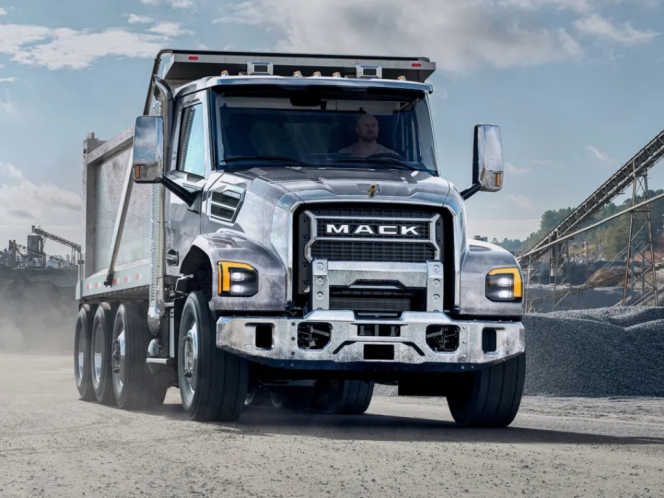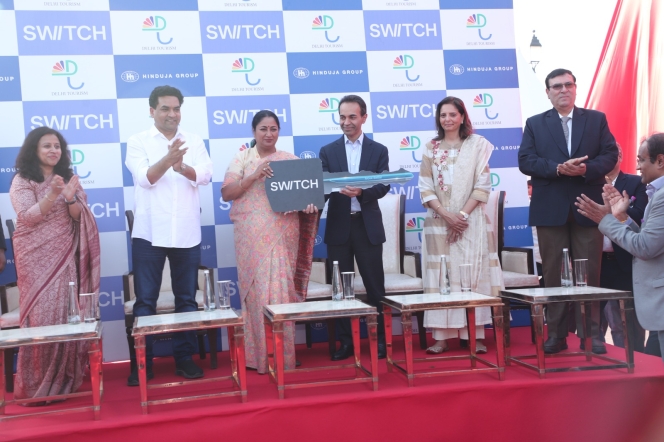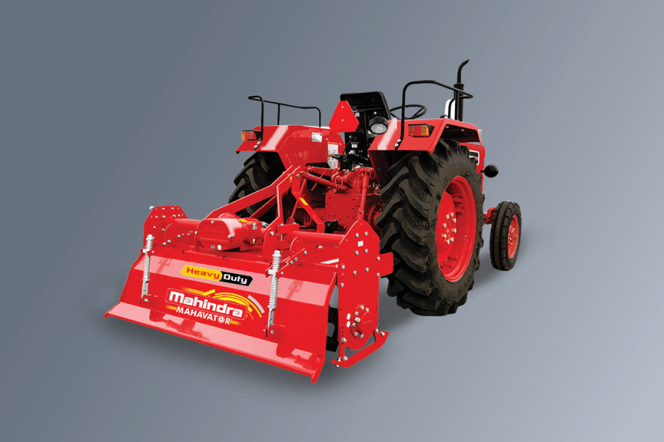- Cooper Corporation
- new plant
- Satara
- Tractor
- NDC Series
- launch
- Maharashtra
- superior performance
- agriculture sector
Cooper Corporation Inaugurates A Tractor Plant In Satara, Maharashtra
- By MT Bureau
- February 04, 2025
Known for its engines, engine components and generators, Cooper Corporation has commissioned a modern tractor plant in Satara, Maharashtra. The plant will produce the Cooper Tractor NDC Series, which is designed to revolutionise farming with its superior performance, fuel efficiency and innovative engineering.
A part of the company’s mission to innovate and provide superior machinery for the agriculture sector, the new plant attracted an investment of approximately INR 500-600 million. The initial capacity of the plant is to produce 2,000 tractors per month in low, mid and high horsepower segments.
To be sold initially in Maharashtra, the Cooper Tractor NDC Series tractor – made at the Satara plant – is designed for tough terrains and heavy-duty operations. It comes with an array of innovative features, such as high fuel efficiency, ergonomic design and lower maintenance costs.
Developed in collaboration with renowned global engineering firms such as Magna Steyr for design, Ricardo UK for engine development, Carraro for transmission and Mita for hydraulics, the Cooper Tractor promises superior performance and savings in fuel, service and operational costs and is tailored for Indian farming needs.
Speaking about the development, Farrokh N Cooper, Chairman and Managing Director, Cooper Corporation Pvt. Ltd., expressed, “Today marks a historic milestone for Cooper Corporation as we step into the agricultural sector with the launch of our first-ever tractor. The Cooper Tractor NDC Series is a result of years of research, innovation and dedication to delivering a product that truly serves the needs of Indian farmers. Built with global expertise and local insights, this tractor is designed to enhance productivity, reduce operational costs and withstand the toughest farming conditions. As a company deeply rooted in Satara, we are proud to contribute to the growth of Indian agriculture and the prosperity of our farmers.”
The tractor – featuring dual-clutch transmission, power steering and a low turning radius of 3 m – is powered by a superior fuel-efficient four-valve engine with a bed plate design, HLA, Bosch Fuel System, ceramic-coated rings, piston cooling Jet and long-life compacted graphite cylinder head,
Highlighting the tractor’s superior performance is its ability to deep plough, to low RPM drop during fieldwork and a quick forward and reverse shuttle lever.
Mack Trucks Unveils Redesigned Granite Vocational Model
- By MT Bureau
- March 04, 2026

American commercial vehicle manufacturer Mack Trucks has revealed the redesigned Mack Granite at the Las Vegas Motor Speedway. The vocational truck features a new cab, updated safety technology and a shift in performance specifications ahead of its display at ConExpo-Con/Agg 2026.
The Granite introduces the Mack Protect safety suite, incorporating front camera and radar with 270-degree coverage. It is the first vocational truck to include radar systems on both the driver and passenger sides.
It features an electronic park brake with rollaway protection and automatic release. A standard system that contacts emergency services upon airbag deployment or rollover detection. Support for up to five camera inputs and an optional digital mirror system. It gets standard front and available side-curtain airbags.
The model is powered by the new Mack MP13 engine, producing up to 540 HP and 1,950 lbft of torque. Mack reports a 3 percent improvement in fuel efficiency over previous versions. The updated mDRIVE automated manual transmission offers 30 percent faster shifts and is available in 12-speed, 13-speed and 14-speed configurations.
Alternatively, customers can specify a Cummins X10 engine paired with an Allison automatic transmission. The truck utilises the MaxRide air load-distributing suspension, a proprietary eight-bag system designed for load management.
The galvanised steel cab is nine inches wider at the B-pillar than the previous model. It features a bonded curved windshield and meets Swedish Impact (BOF10) safety standards.
Interior updates include:
- Ergonomics: A flat-bottom steering wheel and steering column-mounted shifter.
- Displays: A digital instrument cluster and a three-way adjustable steering column.
- Utility: A bodybuilder tower between seats for control mounting and a t-slot dashboard for device attachment.
- Comfort: HVAC ducting in the door panels to deliver air at the driver's shoulder level.
The Granite will be produced at the Lehigh Valley Operations facility in Pennsylvania. Orders are scheduled to open in the second half of 2026, with production commencing in January 2027.
Stephen Roy, President, Mack Trucks, said, “The all-new Mack Granite embodies everything Mack stands for: legendary durability, uncompromising performance and a commitment to our customers who depend on these trucks to get the toughest jobs done. We’ve completely reimagined the Granite from the ground up, bringing the same level of innovation we delivered with our Pioneer and Anthem models to the vocational market.”
Alex Lee, Senior Product Manager, Mack Trucks, stated, “We’re bringing safety technologies to the North American vocational market that have never been available before. Features like the ePark Brake, 270-degree radar coverage and E911 auto-call are going to make a real difference in protecting drivers who work in some of the most challenging environments.”
Caterpillar Unveils AI And Autonomous Technologies At CONEXPO-CON/AGG 2026
- By MT Bureau
- March 03, 2026

Caterpillar, a leading manufacturer of construction and mining equipment, has announced new technology, service solutions and products at CONEXPO-CON/AGG 2026 aimed at productivity, safety and labour shortages. The company is demonstrating a single platform to connect operations through AI and autonomy.
The American company is showcasing the Cat AI Assistant, designed to help teams reach decisions via recommendations and data interaction. The company also debuted its first autonomous soil compactor, the Cat CS12 and Collision Mitigation technology within the Cat Detect portfolio.
Key technological integrations include:
- Fleet Management: A collaboration with Geotab Inc. integrates on-highway data into the VisionLink platform, allowing management of both Cat and non-Cat assets.
- Remote Operation: Live demonstrations are featuring advancements in construction autonomy and remote equipment control.
- Power Solutions: Displayed units include high-horsepower C3.6 and C13D engines alongside connectivity tools for condition monitoring.
The company launched Cat Compact, a destination for small contractors to buy, rent and service equipment. Additionally, a refreshed Cat Rentals brand and digital solution have been introduced to assist customers in monitoring scaled equipment operations.
Caterpillar has updated its service commitments to include next-day parts and two-day repairs, supported by Cat Credits if these targets are not met.
The event serves as the venue for the Global Operator Challenge finals and the inaugural Global Dealer Technician Challenge, recognising the skills of equipment professionals.
Joe Creed, CEO, Caterpillar, said, “As jobsites become more complex, we’re rapidly innovating to simplify how our customers operate and grow – at any scale. This week, we’re demonstrating how a single platform connects the entire operation – empowering customers with AI and autonomy, redefining service and investing in the people doing the work every day.”
Rod Shurman, Caterpillar Construction Industries Group President, said, “Caterpillar is focused on the challenges customers are dealing with right now: labour, safety and productivity. From AI and autonomy in action to full-fleet connectivity to services commitments, everything we’re showing is built to work where and when customers need it most whether it's on the job, in the shop or at the office.”
Switch Mobility Deploys Electric Double-Decker Bus For Delhi Sightseeing
- By MT Bureau
- February 28, 2026

Switch Mobility, the electric vehicle arm of Ashok Leyland and part of the Hinduja Group, has announced the deployment of its Switch EiV 22 electric double-decker bus for the ‘Dekho Meri Dilli’ sightseeing route in the capital. The initiative is being implemented under the Hinduja Group’s Corporate Social Responsibility (CSR) programme.
The service provides residents and tourists with a zero-emission transport option to visit heritage landmarks. The full-day route begins at Dilli Haat – INA and includes stops at Vijay Chowk, Rashtrapati Bhavan, the National Museum, the National Gallery of Modern Art, the Pradhan Mantri Sangrahalya and the National War Memorial at India Gate.
The Switch EiV 22 is a standard-floor, air-conditioned electric double-decker designed and manufactured in India. The vehicle utilises a lightweight aluminium body and features a rear staircase and a wide rear door for passenger access.
Key technical features include:
- Battery: 231 kWh NMC (Nickel Manganese Cobalt) chemistry battery pack.
- Range: Up to 250 km on a single charge.
- Architecture: 650V system with a dual-gun charging setup.
- Capacity: Seating for 65 passengers.
- Cooling: Liquid-cooled battery technology for thermal management.
The bus components are manufactured domestically to comply with FAME II standards. Switch Mobility currently operates electric double-deckers in Mumbai, Ahmedabad, Bhubaneswar and Kerala, with a total of 100 electric tourist buses operational across 10 locations in India.
Dheeraj Hinduja, Chairman, Ashok Leyland, said, “The double-decker bus has always held a special place in India’s public transport story – it is an icon of belonging, of shared journeys, and of city life. Through this CSR initiative, we are proud to breathe new life into that legacy, right in the heart of our national capital. The ‘Dekho Meri Dilli’ experience is our way of giving back to the communities we serve – offering people a beautiful, emission-free way to rediscover Delhi’s magnificent heritage. At SWITCH Mobility, backed by Ashok Leyland’s strong mobility foundation, we are committed to advancing green mobility not just as a business proposition, but as a responsibility to society and the environment.”
Ganesh Mani, CEO – Switch Mobility and COO – Ashok Leyland, said, “The Hinduja Group has always believed that progress must be purposeful – that growth and giving back must go hand in hand. We are not just offering a ride; we are offering a renewed connection to our history, our culture, and our shared pride as Indians – all while treading lightly on our planet. We are proud to see the Switch EiV 22 carry not just passengers, but the spirit of a greener, more purposeful India — one landmark, one journey at a time. Switch Mobility's electric-first vision, backed by the scale and strength of Ashok Leyland, makes moments like these possible — where innovation is not just future-ready, but people-ready.
Mahindra Launches New Rotavator Series For Heavy-Duty Tillage
- By MT Bureau
- February 27, 2026

Mahindra & Mahindra, a manufacturer of tractors and farm machinery, has announced the launch of a new rotavator series. The range is positioned in the heavy-duty category under the Mahavator and Mahavator HD brands, covering widths from 4 to 9 feet.
The series features a wider mast design intended to improve stability and handling during tillage. According to the company, the structural changes were developed based on market analysis and feedback from farmers to address durability on uneven farm surfaces.
The new series replaces several existing models while sitting alongside Mahindra’s current portfolio. A key technical feature in the lineup is the ‘Tez-e’ Intelligent Rotavator, which utilises integrated Bluetooth technology. This system transmits real-time operational data from the farm to a mobile application to support precision farming.
The products are being manufactured at Mahindra’s dedicated units in Nabha, Punjab and Zaheerabad, Telangana.
The company has also introduced limited tricolour-inspired versions in Metallic Orange, Everest White and Metallic Green.
Dr. Anusha Kothandaraman, Vice President & Head – International Operations & Business Head – Farm Machinery, Mahindra Farm Equipment Business, said, “Farm mechanisation is crucial to farm productivity and rotavators play a crucial role in efficiently preparing farmlands. At Mahindra our newly designed rotavators are developed to further deliver superior performance, while also elevating a farmer’s sense of ownership of the farm equipment that support their livelihood beyond tractors. Offered initially in the 4 to 9 feet category, the new look rotavators will reach farmers through a phased rollout across Mahindra's extensive dealer network.”






Comments (0)
ADD COMMENT